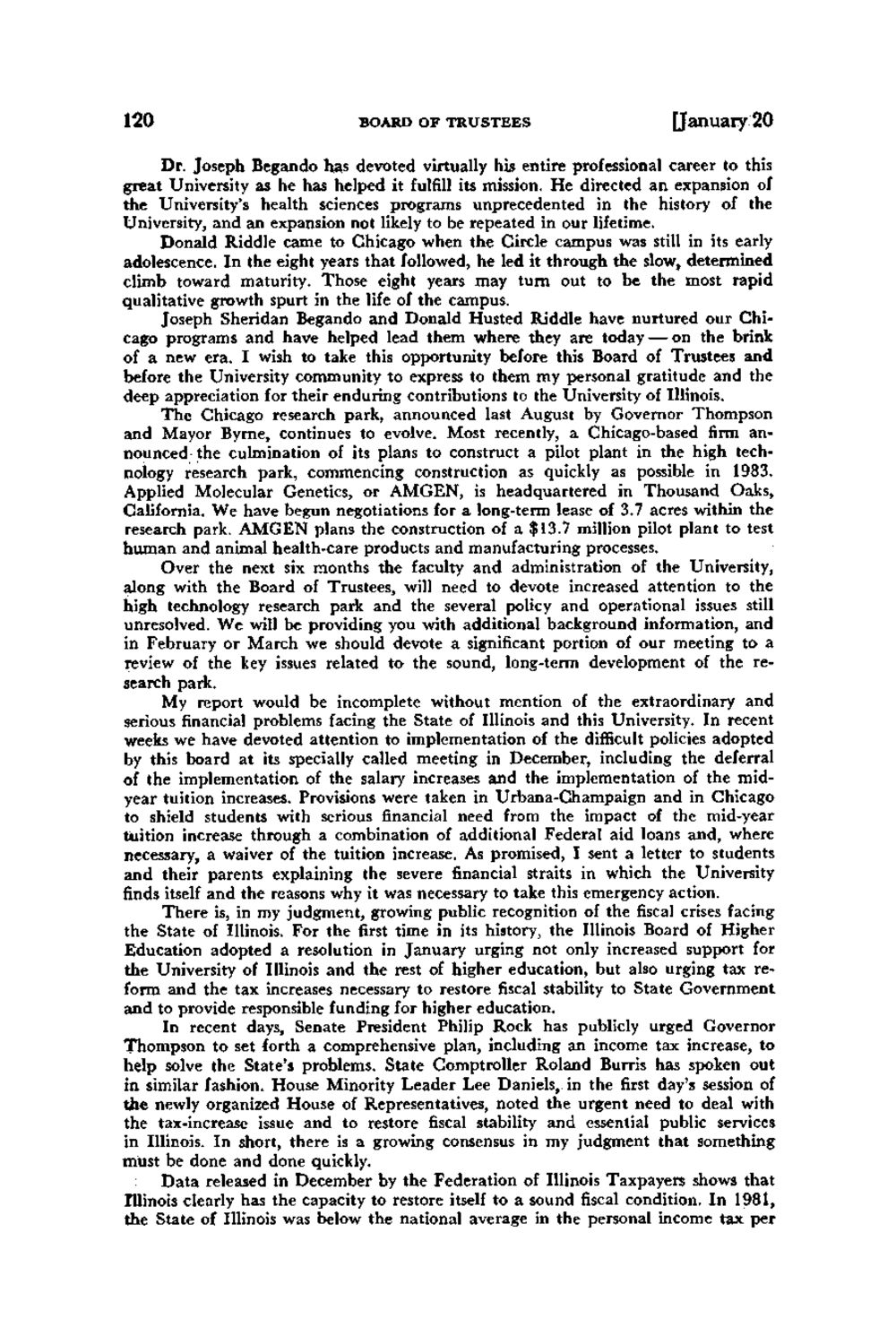| |
| |
Caption: Board of Trustees Minutes - 1984
This is a reduced-resolution page image for fast online browsing.

EXTRACTED TEXT FROM PAGE:
120 BOARD OF TRUSTEES [January 20 Dr. Joseph Begando has devoted virtually his entire professional career to this great University as he has helped it fulfill its mission. He directed an expansion of the University's health sciences programs unprecedented in the history of the University, and an expansion not likely to be repeated in our lifetime. Donald Riddle came to Chicago when the Circle campus was still in its early adolescence. In the eight years that followed, he led it through the slow, determined climb toward maturity. Those eight years may turn out to be the most rapid qualitative growth spurt in the life of the campus. Joseph Sheridan Begando and Donald Husted Riddle have nurtured our Chicago programs and have helped lead them where they are today — on the brink of a new era. I wish to take this opportunity before this Board of Trustees and before the University community to express to them my personal gratitude and the deep appreciation for their enduring contributions to the University of Illinois. The Chicago research park, announced last August by Governor Thompson and Mayor Byrne, continues to evolve. Most recently, a Chicago-based firm announced the culmination of its plans to construct a pilot plant in the high technology research park, commencing construction as quickly as possible in 1983. Applied Molecular Genetics, or AMGEN, is headquartered in Thousand Oaks, California. We have begun negotiations for a long-term lease of 3.7 acres within the research park. AMGEN plans the construction of a $13.7 million pilot plant to test human and animal health-care products and manufacturing processes. Over the next six months the faculty and administration of the University, along with the Board of Trustees, will need to devote increased attention to the high technology research park and the several policy and operational issues still unresolved. We will be providing you with additional background information, and in February or March we should devote a significant portion of our meeting to a review of the key issues related to the sound, long-term development of the research park. My report would be incomplete without mention of the extraordinary and serious financial problems facing the State of Illinois and this University. In recent weeks we have devoted attention to implementation of the difficult policies adopted by this board at its specially called meeting in December, including the deferral of the implementation of the salary increases and the implementation of the midyear tuition increases. Provisions were taken in Urbana-Champaign and in Chicago to shield students with serious financial need from the impact of the mid-year tuition increase through a combination of additional Federal aid loans and, where necessary, a waiver of the tuition increase. As promised, I sent a letter to students and their parents explaining the severe financial straits in which the University finds itself and the reasons why it was necessary to take this emergency action. There is, in my judgment, growing public recognition of the fiscal crises facing the State of Illinois. For the first time in its history, the Illinois Board of Higher Education adopted a resolution in January urging not only increased support for the University of Illinois and the rest of higher education, but also urging tax reform and the tax increases necessary to restore fiscal stability to State Government and to provide responsible funding for higher education. In recent days, Senate President Philip Rock has publicly urged Governor Thompson to set forth a comprehensive plan, including an income tax increase, to help solve the State's problems. State Comptroller Roland Burris has spoken out in similar fashion. House Minority Leader Lee Daniels, in the first day's session of the newly organized House of Representatives, noted the urgent need to deal with the tax-increase issue and to restore fiscal stability and essential public services in Illinois. In short, there is a growing consensus in my judgment that something must be done and done quickly. Data released in December by the Federation of Illinois Taxpayers shows that Illinois clearly has the capacity to restore itself to a sound fiscal condition. In 1981, the State of Illinois was below the national average in the personal income tax per
| |